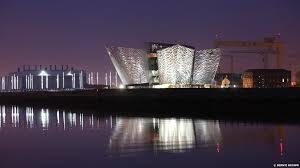
Last week I had the privilege of visiting Belfast, a beautiful city in Northern Ireland which is currently home to a vibrant start up community, a rebuilt downtown area and the new Titanic Museum which I did not get to see. What I did see were some of the so called “peace lines” or walls which were erected back in the early 70s to physically separate Catholic and Protestant neighborhoods in order to decrease the sectarian bloodshed during what the Irish call “the Troubles”.
I was deeply moved by Belfast on a number of levels. One thing that is tremendously inspiring is how the city has rebuilt itself since the Good Friday Agreements were signed 19 years ago. For me the first lesson of Belfast is that people can rise up and transcend their history given time, good faith, and determination.
Over the Line
Visiting the city also drove home the consequences of allowing hate and fear to take the place of understanding and hope as the primary mode of political discourse.
 According to David McKittrick and people were killed during the Troubles and their account of the conflict, Making Sense of the Troubles, has a critical lesson for the world especially given the rhetoric of Donald Trump and others like him who build on people’s fears for political ends.
According to David McKittrick and people were killed during the Troubles and their account of the conflict, Making Sense of the Troubles, has a critical lesson for the world especially given the rhetoric of Donald Trump and others like him who build on people’s fears for political ends.
Although the conflict is clearly the result of deep political and historical currents dating back to the 1920’s and beyond, what is most concerning is not the political conflict itself but how that conflict moved from a political problem to a human tragedy of epic proportions.
When violence first erupted in 1969 and the Protestant controlled Northern Irish government requested the support of Brittish troops, they were initially welcomed in the Catholic neighborhoods as providing protection. Over time, however, the Brittish army reluctantly became part of the problem and the province became mired in a complex and deadly tit for tat as the both the IRA and the UVF and other paramilitary organizations carried out killings and bombings of public places including pubs.
Besides the hardened and deadly political terrorists who carried out many attacks, a number of men emerged on both sides of the conflict who appeared to kill for its own sake. Lenny Murphy, for example, was the notorious head of the Shankill Butchers Gang and nominally connected to the UVF. The IRA expelled a similar monster called Dominic ‘Mad Dog’ McGlinchey who reportedly boasted of killing 30 people and did so in the name of a group called the Irish National Liberation Army.
There is a direct line between the politics of uncompromising conflict, such as that endorsed for many years by Ian Paisley and the actions of such psychopaths. By providing a political logic for their behavior, such politicians are, in my view, morally complicit in their actions.
An Uncertain Future
When I was there, there was no government in Northern Ireland due to a number of issues including a botched clean energy scheme and the future of the Irish language in the province. The thing is that the Good Friday framework requires that a Protestant and Catholic share the posts of First Minister and Deputy First Minister and so far it seems unlikely that the Unionist leader Arlene Foster and Sinn Féin’s Michelle O’Neill will come to an agreement forcing new elections.

Ms. O’Neill succeeded Martin McGuinness who played a key role in ending The Troubles and who passed away last week.
The day after I visited Belfast, The U.K.’s Prime Minister, Teresa May, officially informed the European Union of the United Kingdom’s intention to leave the European Union which, as I have written before, triggers article 50 of the Treaty on European Union.
Brexit has the potential to disrupt the normalization of Irish relations across the border between North and South which is all but invisible today. The six counties of Northern Ireland are part of the United Kingdom while the republic of Ireland will remain in the European Union.
The good news is that so far, the political issues are still political and public discourse is still civil and more or less constructive. The bad news is that almost 20 years after reaching and living with an agreement to share power, the peace lines are still up between Shankill Road and the Falls!
The message to political leaders who want to build walls is that it can take generations to remove them.


The problem is that the situation is changing continuously. The Unionists voted for the union with Britain and not about EU membership, but yet the majority of voters voted to ‘remain’ in the EU. If Mrs May really cared about Northern Ireland (NI) she would have put more effort into making sure a power sharing deal was in place before calling the election. Scotland may think it has problems with London, but it is clear now that NI is the poor relation. I am sorry to say there is little hope of any change in the day to day situation in NI.